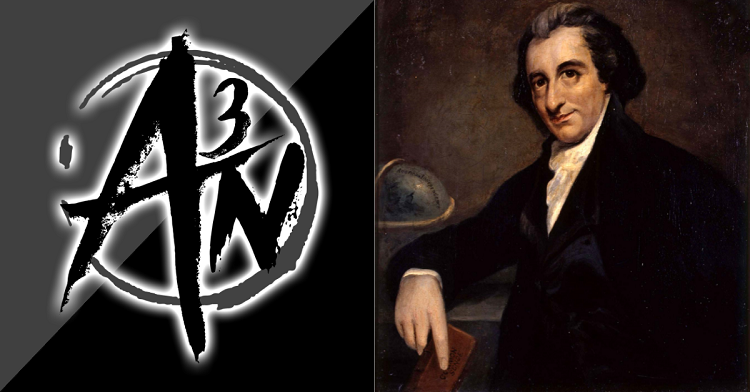
Thomas Paine – Universal Rebel
The other day, I found myself in a conversation about the Founding Fathers. When it came up that the person I was talking to was a big fan of Thomas Jefferson, I expressed my disapproval and went into my reasons. It’s kind of hard to support the universal equality of men while “owning” slaves, and if he truly opposed slavery as a practice, he would have finished the rebellion to the crown by ceasing his own practice. After some back and forth, I mentioned the fact that if we’re going to talk about Founding Fathers, to me, there’s little substitute for Thomas Paine. A radical thinker for his time, firm advocate for the abolition of slavery, firebrand for extreme freedom, and critic of the relationship between the church and the people (and the church and state respectively), he was at least a century before his time.
After some looking into him, the person I was talking to said he would have to dig more into Paine. This is the reaction I normally get when discussing the man. He was the reason the common person rallied behind the American Revolution, yet people don’t discuss him for the most part? There are many potential reasons for that, but I believe it to be firmly rooted in the fact that the education system, media, and political class, would rather people not know that there was a founder as radical as him. The image of dignified, stuffy, powdered-wigged, suit wearers who, despite some ethical compromises, were the best you could get at the time, is advantageous to an environment of political compromise, and including Paine in such a group when he was anything but, reduces their advantage in such a quest as to make us servile. In that spirit, I want to go over a few of his accomplishments, and the reason he should be the role model for true revolutionaries.
First, let’s look at his stance on slavery, and his refreshing change of pace from the boilerplate Founding Fathers we’ve heard about before. African Slavery in America was a beautifully written letter he wrote prior to his membership in America’s first slavery-abolition organization, and it starts beautifully.
“That some desperate wretches should be willing to steal and enslave men by violence and murder for gain, is rather lamentable than strange. But that many civilized, nay, christianized people should approve, and be concerned in the savage practice, is surprising; and still persist, though it has been so often proved contrary to the light of nature, to every principle of Justice and Humanity, and even good policy, by a succession of eminent men, and several late publications.”
He accused slaveholders of a willful sacrifice of “conscience, and the character of integrity to that golden Idol.” He said they had no right to do it; that the 100,000 enslaved yearly, along with the third who died, were a “lamentable” loss of innocent human life. He then went on for four paragraphs, slashing the distorted Christianity used as a basis for it.
But he didn’t stop at slavery – he drove at the very heart of government in a document which was arguably the single greatest mobilizer of colonists against the British. Without Paine, the Revolution literally would not have happened. But he did so with an arguably anarchist creed against the crown with this blistering paragraph I’ll include, nearly unedited.
“[I]t is more than probable, that, could we take off the dark covering of antiquity and trace them to [Kings’] first rise, we should find the first of them nothing better than the principal ruffian of some restless gang, whose savage manners or pre-eminence in subtilty obtained him the title of chief among plunderers: and who by increasing in power and extending his depredations, overawed the quiet and defenceless to purchase their safety by frequent contributions. Yet his electors could have no idea of giving hereditary right to his descendants, because such a perpetual exclusion of themselves was incompatible with the free and unrestrained principles they professed to live by. Wherefore, hereditary succession in the early ages of monarchy could not take place as a matter of claim, but as something casual or complemental; but as few or no records were extant in those days, and traditionary history stuff’d with fables, it was very easy, after the lapse of a few generations, to trump up some superstitious tale conveniently timed, Mahomet-like, to cram hereditary right down the throats of the vulgar. Perhaps the disorders which threatened, or seemed to threaten, on the decease of a leader and the choice of a new one (for elections among ruffians could not be very orderly) induced many at first to favour hereditary pretensions; by which means it happened, as it hath happened since, that what at first was submitted to as a convenience was afterwards claimed as a right.”
That’s right – a century before Spooner would claim government is simply a gang of robbers who declared themselves such, and before Rothbard would call them “a gang of thieves writ large”, Thomas Paine was doing just that. And his word would ring out in the ears of the colonists. Who is some foreign crown to tell us how to live? Who is some King to assert dominance over us simply by way of bloodline? These questions resulted in statist conclusions repeatedly and thoroughly destroyed in Common Sense, to the point where John Adams said, “Without the pen of the author of ‘Common Sense,’ the sword of Washington would have been raised in vain.”
More so, he literally served under George Washington’s army, and was a substantial reason their morale remained high enough to keep fighting after conditions continued to worsen. He’s literally the person who came up with the phrase, “These are the times that try men’s souls.” In The American Crisis, one passage rings true to me, even today.
“There are Cases which cannot be overdone by language, and this is one. There are persons, too, who see not the full extent of the evil which threatens them. They solace themselves with hopes that the enemy, if they succeed, will be merciful. It is the madness of folly to expect mercy from those who have refused to do justice; and even mercy, where conquest is the object, is only a trick of war: The cunning of the fox is as murderous as the violence of the wolf, and we ought to guard equally against both.”
For those of you who’ve been paying attention to the way Trump has been speaking about anarchists, and the fact that the vox populi seems to be ever increasingly in his favor in such a regard, it should be clear that no peace is possible in the long term, should you be dealing with abusers and usurpers. We can have 100% validity and soundness with our philosophy, and have the ethical upper hand to the fullest extent, and yet these warmongers will still find a way to make war of it. They are not interested in a peaceful solution. And they will not let one succeed. The same thing could be said for the British and the American Revolution, attempting to whittle down American forces and then bait them with promises of mercy should the war cease. Not only was this unlikely, but it was also counter to the goals of the revolutionaries who wanted nothing more than pure victory, in the beginning. His words are arguably the reason the revolution persisted as long as it did, keeping people in good spirits, and emboldened to the fight.
He went on to support the French Revolution by writing a book called The Rights of Man and subsequently traveling to France for translation purposes. It was a direct rebuttal to another work attempting to criticize French revolutionaries for a variety of reasons. That means that once he got done helping the people here in the US, he went all the way to France to help them with their revolution. And considering the fact that the French revolution led to a wide variety of modern libertarian ideals, not the least of which is the use of the word in a political context, Paine was instrumental in all of what could broadly be considered modern day libertarianism, both the US version and the European originator.
So, why don’t we hear more about this guy? Well, because he was a “filthy little atheist”. At least according to the lies of lesser men, such as Theodore Roosevelt. But as J. H. McKenna, Ph.D. said it, “Roosevelt called Thomas Paine a ‘Filthy Little Atheist,’ a phrase with as many errors in it as words, since Paine was fastidiously clean, stood taller than most of his contemporaries at five feet ten inches, and was a professed believer in God.” This lie spread because he circulated materials criticizing organized religion. His book, Age of Reason interrogated the Christian Bible and the Church, and deconstructed a lot of what he saw as man’s flawed interpretations of God. Allegedly, his work caused a lot of people to become atheist, so the Church and its adherents hated him, and by extension, a huge chunk of society. Despite being instrumental in both the founding of the country and the popularity of independence as a concept, he was shuttered out of the majority of historical coverage relating to the founding of the country until about the 1970s.
I don’t know how much clearer a case can be made that this country was founded on anything but freedom, much less religious freedom. If still being a deist, but being critical of the religious establishment and its interpretation of religious doctrine can get you erased from the history in which you were instrumental, this country and its “Bill of Rights” are both anathema to freedom, and do not provide the proper protections for people of a variety of faiths and religious persuasions to thrive just as everyone else.
In summation, I figured I’d write this up in hopes of getting somebody interested in Thomas Paine who was previously disinterested, or who would simply not heard of him, whether via a propaganda campaign by small minded statists or by the outright censorship of his work by the establishment (both church and state), this beacon of Liberty in a statist den of criminals was put under a bushel.
I could write much more on the subject of this man, but one thing I will say is that anybody attempting to break into libertarians spheres, especially American libertarian spheres hyper-saturated by compromise, backstabbing, and ethical and ideological corruption, should read up, because even if you lose all your supporters, even if you stand 100% alone, like Thomas Paine did many times, having been cast aside by so many of the establishment which he assisted, you must keep a strong back, and stand upright, because the victims of the enemies of Liberty, both past, present, and future, are all relying on you to prevent their innocent blood from being spilled again. And remember the words of Paine, should your detractors nip at your heels, with vapid emptiness, and with all the craven vigor which accompanies being establishment shills…
“He who dares not offend cannot be honest.”










1 comment
Hogeye Bill
October 17, 2020Great article! To quibble a bit, in his later days Paine had some unlibertarian ideas, such as his support for what we would call UBI, and his attempts to get the government to subsidize a bridge he designed. But we don’t talk about later Paine or Rothbard! 😉